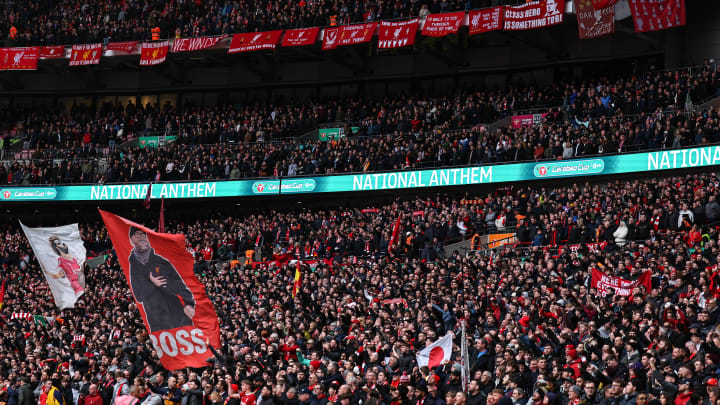Why do Liverpool fans boo the England national anthem?
- Liverpool fans are always vocal on their trips to Wembley Stadium
- The Merseyside fans were booing ahead of the 2024 Carabao Cup final against Chelsea
- The disconnect was forged in the 1980s

Few managers of the modern era have developed a bond with their club's fanbase as strong as the link between Jurgen Klopp and Liverpool.
A rapidly stacked trophy cabinet has obviously helped Klopp win over Merseyside but the humble and honest German coach has forged such a deep connection with the people of Liverpool by taking time to understand the history and beliefs of the city.
However, even Klopp was left a little perplexed by the deafening swell of boos which his supporters delivered in response to the English national anthem ahead of the 2022 FA Cup final.
“I know our people that well that they wouldn’t do it if there was no reason for it," Klopp reasoned, before admitting: "And I’m not here surely not long enough to understand the reason for it."
As Liverpool fans took the 2024 Carabao Cup final against Chelsea as another opportunity to voice their distaste, here's why there is such a strong reaction to the national anthem.
Why do Liverpool fans boo the England national anthem?
We're not English. We are Scouse. http://t.co/rcmBRtO1
— Liverpool FC (@LFC) March 17, 2012
As a port city which has welcomed countless immigrants over the years, many Liverpudlians have an ancestral reason to not consider themselves English. The xenophobia and racism which remains a plague on these shores are not exactly a set of welcoming, open arms.
The term ‘Scouse’, which is a traditional stew, was originally used as a derogatory term for Irish immigrants that could only afford to frequent soup kitchens. But the city's inhabitants have harnessed the slur and the sense of otherness it was meant to hold.
Engraved in in the wall of the Museum of Liverpool is a quote from the former Gronby councillor Margaret Simey in 1999 which reads: "The magic of Liverpool is that it isn't England."
Liverpool’s port points west, which was particularly unhelpful during the 1980s when trade with Europe on the other side of the Isles was being prioritised. Naturally, this only stoked the flames of a dire relationship between Liverpool and the British government.
"Never Trust A Tory" is another common banner which can been seen circulating the Liverpool end on trips to Wembley.
This distrust has only festered over the last decade of Conservative rule. Labour - the more left-wing opposition in England to the Conservatives - have not had a prime minister in power since Gordon Brown in 2010.
Unlike the rest of the country, Liverpool have not given in to the blue invasion. The Labour Party has received more than 50% of the city’s votes in every general election between 1992 and 2019.
This unwavering favouring of Labour came immediately after Margaret Thatcher’s unpopular reign as Conservative party leader and prime minister. Thatcher's Chancellor Sir Geoffrey Howe argued that Liverpool should be left to "managed decline”, as revealed by cabinet papers from the era which fed the distrust of that regime on Merseyside. In the wake of the Toxteth Riots, Howe urged Thatcher "not to over-commit scarce resources to Liverpool”.
The Conservatives and Thatcher were also in power at the time of the Hillsborough disaster and their handling of the situation, over a course of a decades-long quest for justice, also enraged a wounded city and its people.
The Tory hatred wasn’t always so suffocating. When the Iron Lady became prime minister in 1979, Sir Malcolm Thornton was first elected as Conservative MP for Liverpool Garston.
However, the distrust very much extends to the modern era as Boris Johnson, when prime minister, was asked to apologise for publishing an article in the Spectator which accused Liverpudlians of “wallowing” in their “victim status” while he was the publication's editor in 2004. Shockingly, he did not offer a sorry amid his blustering response.
At Liverpool’s first FA Cup final triumph in 1965, the travelling Merseyside support belted out “God Save Our Gracious Team”. For many reasons, Liverpool fans have opted for a blunter approach over the subsequent years.
READ THE LATEST LIVERPOOL NEWS, TRANSFER RUMOURS & GOSSIP
feed